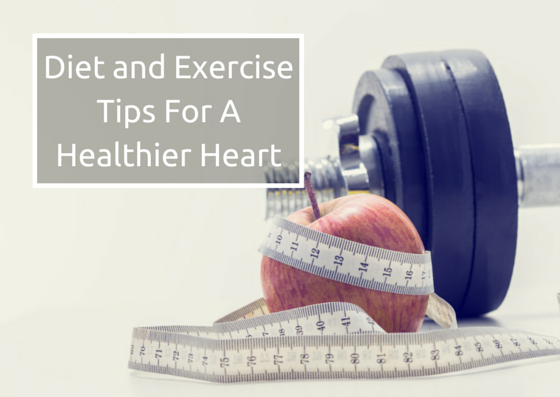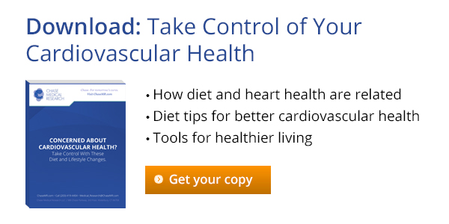The old adage about, “You are what you eat,” is true, especially when it comes to alleviating and reducing symptoms of cardiovascular disease. What you eat, when you eat and how you eat can all reduce or in some cases even eliminate symptoms of heart issues.
Consider this, your heart is your body’s “engine.” It’s what pumps the blood that feeds your brain and other organs. It keeps you alive. The kind of fuel you put into your body is what keeps that engine running.
You wouldn’t put sludge into your car’s gas tank and expect your automobile to keep running, would you? Yet many of us don’t think twice about putting sugar, fat and empty calories into our bodies, not realizing our bodies will run poorly, or even stop running entirely.
It’s no secret a poor diet can lead to obesity, diabetes and cardiovascular problems, but fueling your body with the wrong foods can also cause hypertension (high blood pressure), strokes, sleep apnea, and high cholesterol as well. Medication can help with some symptoms, but diet and exercise are the best choices for getting or staying healthy.
Diet

Diet isn’t just about “calories in and calories out.” It’s about getting the right nutrients to your body in a form it can use it. Food doesn’t just keep us from feeling hungry. Food is what our body uses to heal and regenerate cells, and to keep us functioning at the best energy levels possible.
So stop counting calories, and start thinking about eating the right amount of nutrients. A calorie is not just a calorie.
For instance, 100 calories from a couple of cookies isn’t the same as 100 calories from an apple.
The cookies may taste better, but your body needs the nutrients in the calories from the apple. It will use them for fuel and to keep your hormones and other brain and body functions working correctly. The cookies will have little or no nutrients, but lots of sugar and fat, leaving your body craving what it really wants while converting the calories it can’t use into extra weight.
Hunger is your body’s way of telling you what nutrients and the kind of fuel it needs, not that your stomach is empty. Ever have a craving for something? That’s your body’s way of telling you it’s lacking something.
Exercise
Exercise isn’t just something we do to burn calories. Exercise is critical to good health because of what happens before, during and after we work out. It creates the formation of hormones that lower blood pressure, reduce bad cholesterol and increase good cholesterol.
Exercise also increases levels of serotonin, which improves our moods and makes us feel good. Exercising increases our energy levels. A quick 15-minute walk encourages blood flow, brings more oxygen to our brain and muscles and stimulates muscle development. Exercise reduces your chances of stroke, diabetes, and even certain types of cancer. And finally, 15-to-30 minutes of exercise during the day can help you sleep better at night.
Exercise doesn’t have to mean sweating in a gym, lifting weights or running, unless you really enjoy those activities. Riding a bike, walking with a spouse or friend, doing water aerobics or swimming, or even hiking, tennis and sports where you’re active are also exercise.
As long as you’re getting your heart rate up in a sustained manner over a period of time, and giving your muscles a workout, you’re exercising. The thing about finding an activity or sport you do enjoy ensures you’re more likely to keep doing it. Ask your doctor about different activities you think will get your body moving enough to contribute to a healthy exercise routine.
Improve Your Health
Taking small steps with diet and exercise each day can improve your health and help you live life you deserve.
If you're interested in learning more about some steps you can take to better your health, download our free white paper.
Our white paper covers dietary information and explains the connection between what you eat and your heart health. Click the button below to download now and learn more.
Share This Post
Recent Posts
- Obesity and Cardiovascular Disease: Is There a Link? January 14 2015
- Lp (a), A New Lab Test for Cardiovascular Risk January 14 2015
- Mediterranean Diet and Lifestyle Choices for Improved Health January 14 2015
- Understanding the Relationship Between Obesity & High Blood Pressure January 14 2015
- Cardiovascular Diseases Explained January 14 2015
Categories
- Clinical Trials
- Cardiovascular Disease
- Diabetes
- Obesity
- Kidney Disease
- Pain Management
- Female Sexual Dysfunction
- Hypertension
- Migraine
- Vaccine
- Chronic Obstructive Pulmonary Disease
- Osteoarthritis
- Biologics
- COVID-19
- Cholesterol
- Diabetic Peripheral Neuropathy
- Gastroesophageal Reflux Disease
- Irritable Bowel Syndrome with Constipation
- Lyme Disease
- Nonalcoholic Steatohepatitis
- Respiratory Syncytial Virus



